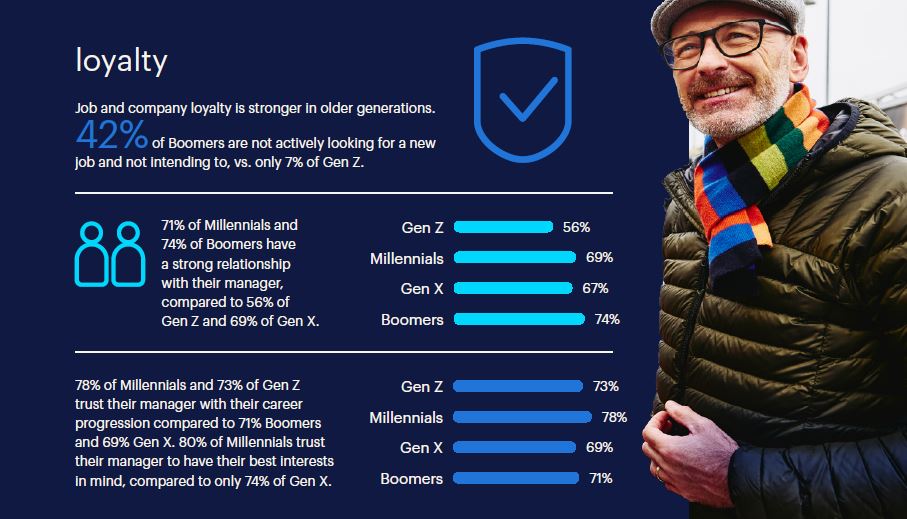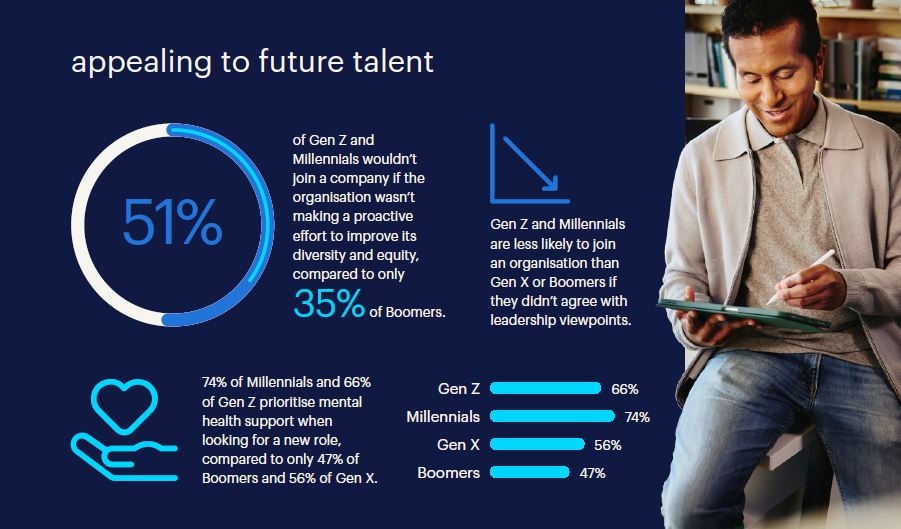randstad workmonitor.
Our annual survey of over 26,000 employees across 35 countries is one of the largest studies of its kind in the world. In the UK, we surveyed over 1,700 employees to provide you with the latest recruiting trends.
download latest reportworkmonitor 2025 infographics
access full report-
workmonitor 2025 infographics
-

gen z in the workplace
Uncover the key characteristics of Gen Z in the workplace, including their distinct perspectives on work type, skills and development, company culture, and loyalty. This infographic displays Gen Z priorities including; career progression, technological proficiency, and a strong sense of belonging, while also demonstrating a proactive approach to addressing workplace issues. Click on the image to download the infographic.
-

generational trends
Discover generational trends in the workplace. This infographic focuses on differences in work types, skills, development, behaviours, outlook, company culture, values, and loyalty, drawing comparisons between Gen Z, Millennials, Gen X, and Boomers across various aspects of their work experience. Click on the image to download the infographic.
-

ED&I in the workplace
Explore generational differences in attitudes towards diversity, equity, and inclusion (DE&I) in the workplace. This infographic highlights how Gen Z and Millennials place a higher value on belonging, inclusive cultures, and proactive DE&I efforts compared to Gen X and Boomers. Click on the image to download the infographic.
explore the themes for 2025.
The 2025 Workmonitor reveals a fundamental shift in workforce expectations, based on insights from over 26,000 individuals across 35 markets. Talent are redefining what they want from work around a new baseline shaped by three distinct pillars representing the why, how and who of work.
-
motivated by personalisation
why we do it.
Work today is about more than just a paycheck. Talent globally are looking for workplaces that align with their personal values, aspirations and circumstances.
Almost a third of talent have quit a job because they disagreed with the views of leadership and a similar number have left due to a lack of personal development or progression opportunities.
And for the first time in Workmonitor’s 22-year history, work-life balance surpasses pay as the leading motivator. Compensation is still important, but talent are more focused than ever on finding other ways to feel fulfilment.
-
fostering a sense of community
who we do it with.
Finding a sense of belonging at work is not only desirable for talent. More than eight in 10 say it also improves their performance and workplace wellbeing. Many are now seeking a sense of purpose and connection in their professional lives.
However, 62% report hiding aspects of themselves at work (up from 55% the year before), and 43% have quit a job due to a toxic working culture.
And while talent are clear on the value of workplace equity, 56% say their organisation is not doing enough on this front.
-
gaining opportunities through skilling
how we are doing it.
Technological advancements — particularly in AI — are reshaping the future of work at pace. Talent are conscious of this with 42% saying they would not accept a job that did not offer chances to develop future-ready skills.
While 64% believe employers have improved support for skilling, workers are increasingly taking ownership: 24% are willing to upskill themselves, though 37% still view reskilling as primarily the employer’s responsibility.
Gaps persist between desire for training and those receiving it. Younger talent and managers are reaping the greatest benefits, but given systemic talent scarcity, organisations must ensure skilling opportunities reach all talent.
2025
UK edition.
previous editions.
Access previous editions of Randstad's workmonitor report.
-
2024
-
2023
-
2022
-
2021
-
2020
-
2019
-
2018
download the report
enter your details to download your free copy of workmonitor 2025 (UK edition)




